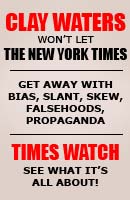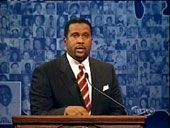
|
No Fairness Doctrine for PBS EXECUTIVE SUMMARY
The Democratic takeover of Congress in 2007 quickly made one definitive change in the national media infrastructure. For the first time since Newt Gingrich became speaker in 1995, America's public broadcasting system didn't have a skeptical majority party that might sporadically ask questions about PBS using the taxpayer-funded airwaves for overt liberal activism. In previous years with Democratic control of Congress, PBS has played a more activist role within the media, dragging the rest of the national media further to the left and spurring more aggression and ill will against conservative and Republican leaders. Just as 2007 has been a year for a "surge" of troops in Iraq, it's also been a year of "surging" activism within PBS. At the same time, Democratic congressional leaders now in the majority have been entertaining the idea of reviving a federal "Fairness Doctrine" which would require private broadcasters to comply with notions of balancing out each station's daily schedule of news, talk, and public-affairs programming. These same Democrats have been highly offended at the idea that anyone outside or inside taxpayer-funded broadcasting would monitor PBS content for fairness or balance. Despite taking federal money from all taxpayers, PBS stations across America often air programs and documentaries that tilt decidedly to the left. In funding filmmakers to go out and make one-sided left-wing films and talk programs, public broadcasting subsidies serve, in effect, as ideological pork-barrel spending. While conservatives like Frank Gaffney have seen their films stripped from the national PBS schedule due to his activist "day job," liberal activism is not eschewed at PBS, but encouraged. In this analysis, the Media Research Center outlines three trends that herald an increasing misuse of public television against American conservatives: Bill Moyers and His Impeach-Bush Bandwagon. Partisanship was redefined as statesmanship when the latest reincarnation of the PBS program Bill Moyers Journal devoted an hour of supportive air time on July 13 to two guests who agreed that President Bush and Vice President Cheney urgently need to be impeached. Even PBS Ombudsman Michael Getler found the show wasn't remotely balanced in its zeal to abort the Bush presidency, reporting "there was almost a complete absence of balance." Tavis Smiley Campaigns Against the GOP. PBS authorized Tavis Smiley, who hosts a nightly natonal talk show out of Los Angeles PBS station KCET, to organize two presidential debates at black colleges in 2007. The Democratic debate in June was overtly friendly and barely made a national ripple. But in September, Smiley grew furious when four Republican front-runners decided to skip the GOP debate right before the third-quarter campaign fundraising deadline at the end of the month. He skewered the candidates before, after, and during the debate on PBS, and also took his anti-GOP outrage to other TV networks. On his PBS show, he asked if the no-show Republican candidates "will pay" and suggested the empty podiums he set up to dramatize their absence will be props in Democratic campaign ads in 2008. The "Independent" Television Service. ITVS, a left-wing filmmakers' collective with its headquarters located in Nancy Pelosi's San Francisco district, draws about $15 million a year from the Corporation for Public Broadcasting to make films supporting their statement of values that "a civilized society seeks economic and social justice." Taxpayers have funded a long list of films knocking the Bush administration's policies, celebrating leftist agitators, and promoting "progressive" sexual politics. Nurturing a new generation of liberal filmmakers, and not conservative filmmakers, is the mission of ITVS. The report concludes with some simple recommendations for public broadcasting executives. Since public television is supported by taxpayers of all political stripes, the Corporation for Public Broadcasting ought to live up to its mandate to monitor content for objectivity and fairness. Calling for impeachment of Republican presidents with one-sided panels doesn't help make PBS look fair. If public broadcasters want to moderate presidential debates, its moderators ought to display fairness and balance toward both political parties. If the system funds liberal filmmakers, it ought to fund conservative filmmakers as well, and not just serve as a political organizing tool for one side. The nation's PBS stations should reflect the diversity of its whole audience. |
|
The Media Research Center To schedule an interview, please contact Colleen O'Boyle or Tim Scheiderer at (703) 683-5004
Home | News Division
| Bozell Columns | CyberAlerts |













